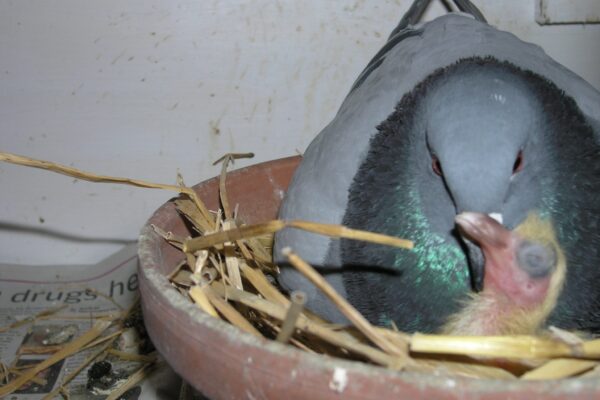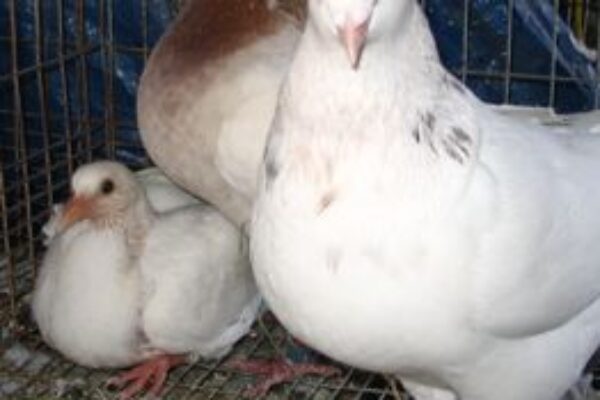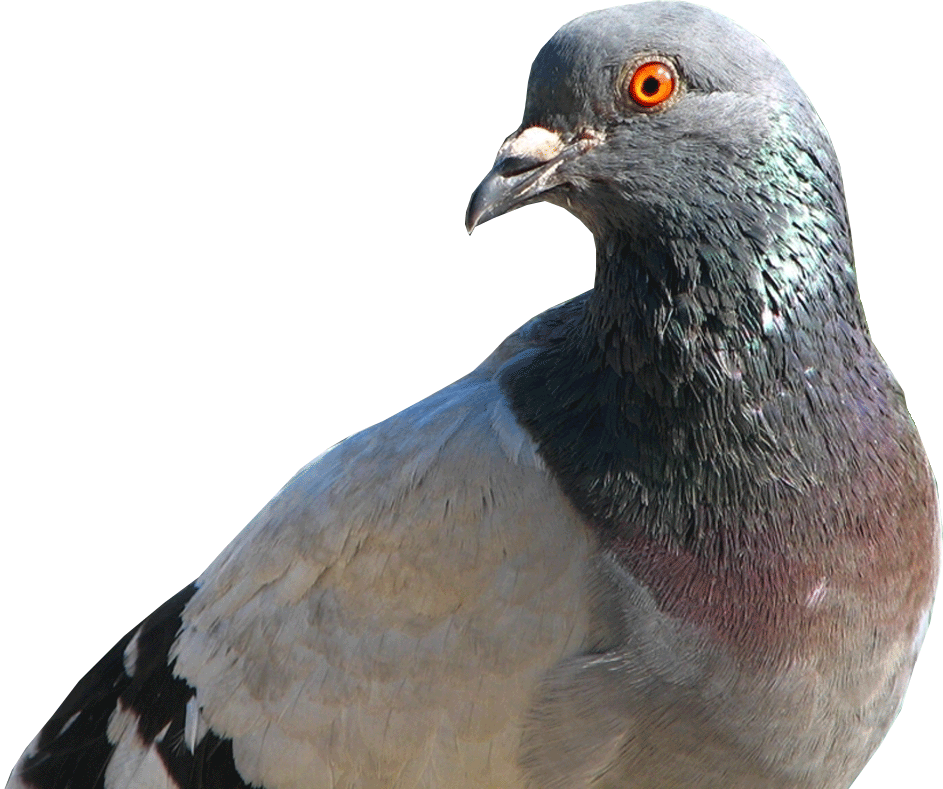Garlic; Facts For the Fancier
 Garlic, whose scientific name is Allium sativum, is a common plant, used worldwide for food. Since ancient times, garlic has been used for a variety of human ailments and problems, and even magical properties to ward of evil spirits have been attributed to garlic. In fact, it was once considered to be absolutely essential in warding off vampires. In more modern times, the use of garlic has been a topic of research, especially in human medicine. Garlic has been reported to have insecticidal, antibacterial, antifungal, and anti-tumor properties, as well as those of lowering blood sugar and fat levels, and reducing the dangerous plagues that bring about the plugging of blood vessels that lead to heart attacks and strokes in humans. It seems that popular interest is greatest in Germany where garlic preparations for humans account for the largest sales of all over-the-counter drugs. How garlic affects racing pigeons is speculative, but here are some general facts gleaned about this plant from a few medical and nutritional publications.
Garlic, whose scientific name is Allium sativum, is a common plant, used worldwide for food. Since ancient times, garlic has been used for a variety of human ailments and problems, and even magical properties to ward of evil spirits have been attributed to garlic. In fact, it was once considered to be absolutely essential in warding off vampires. In more modern times, the use of garlic has been a topic of research, especially in human medicine. Garlic has been reported to have insecticidal, antibacterial, antifungal, and anti-tumor properties, as well as those of lowering blood sugar and fat levels, and reducing the dangerous plagues that bring about the plugging of blood vessels that lead to heart attacks and strokes in humans. It seems that popular interest is greatest in Germany where garlic preparations for humans account for the largest sales of all over-the-counter drugs. How garlic affects racing pigeons is speculative, but here are some general facts gleaned about this plant from a few medical and nutritional publications.
The principal, active agent of garlic is allicin, a sulfur-containing compound, which, with its breakdown products, produces the characteristic odor. The odor is related to the presence of sulfur. When the cloves are crushed, allicin is formed by the action of enzymes on a precursor chemical known as alliin. Other biologically active compounds related to allicin, such as ajoene may be extracted from garlic as well. The positive effects of fresh cloves of garlic seem fairly certain, whereas information for modern commercial preparations in general is not very convincing. One reason for the difficulty of showing the effectiveness of garlic is that many active chemical compounds in the cloves may be lost during processing. For example, carefully dried sliced cloves retain their potency, but extracts or oils prepared by steam distillation or organic solvents may have little activity. Cold-aged extracts have a reduced odor and may retain more of the activity of garlic. Allicin is known to break down during steam distillation for the production of the volatile oils used in many garlic preparations. As well, the alliin content of natural garlic can vary 10 fold. There is also confusion about the issue of “odorless” garlic preparations. Some of them have no aroma, but neither do they contain any active ingredient. Some active preparations may not have an odor, but if allicin is released when the product is eaten, there is a very good chance that there will be a detectable aroma—and it is the aroma that is one of the problems. Potency of garlic appears to depend on pungency,– that is odor. Once garlic is dried into odor-free powders or pills, it loses some of the properties that may make it useful in health!
Distilling all of the information about garlic to a few simple statements is very difficult to do. However, it seems that, whatever the basis for its use, fresh cloves are the superior source for the important ingredients of garlic. Other commercial preparations such as powders or oils may or may not be useful, since the processing procedures may dilute or eliminate the effective compounds. If you have a choice then—and most of us do—buy cloves of garlic from your grocery store and prepare fresh solutions as you need them. Given the “touchy” nature of the important, active compounds in garlic, it seems likely that heating or boiling crushed cloves above 60� C ( remember water boils at 100� C ), may be enough to cause a major loss of these key substances. On the basis of this information, it is logical that home preparations of solutions of garlic should not be heated, in order to retain the important compounds in the solution. Be aware that allicin is readily converted to a more volatile compound called diallyl disulfide—which means that its effects can be transient.
Allicin is known to have antibacterial properties and has been said to be effective in concentrations as low as 1:125,000 ( that is, one part allicin to 125,000 parts water). When compared with penicillin, allicin is said to have an activity that is about 1% of the activity of penicillin. Garlic inhibits the growth of, or kill, about two dozen kinds of bacteria (including Staphylococcus and Salmonella spp.), and at least 60 types of fungi and yeasts. Allicin appears to be the major chemical responsible for this effect. So if the aroma is destroyed by cooking or processing, and allicin is associated with the odor, garlic may lose its ability to fight bacteria, mold and yeasts. In one recent study, researchers looked at the ability of garlic to kill the organism causing tuberculosis. They added an allicin-rich garlic extract to 30 strains of tuberculosis-causing bacteria growing in test tubes. A month later, the garlic had done critical damage to all 30 cultures.
The trace minerals selenium and germanium are two constituents of Japanese garlic, and these minerals may have some effect by their activity firstly, as antioxidants, that is, substances that protect cells and tissues from the damaging effects of peroxides in the body. Secondly they are important in the normal development of the immune system, and thirdly, they may have good activity as anti-cancer agents. Selenium itself has been shown to have a broad spectrum of anti-cancer activity in rats, for example.
On the other side of the coin, many cases of allergic reactions to garlic are known to occur in humans. Reactions such as dermatitis ( inflammation of the skin) and asthma are reported. One investigator found that the maximum tolerable dose of fresh aqueous extract ( i.e extracted into a water-based solution) in humans to be 25 cc (slightly under one ounce). Amounts greater than this caused severe burning sensations in the esophagus (gullet) and stomach, as well as vomiting. Some compounds extracted from garlic are similarly irritating to tissues in the mouth of humans.
A possible benefit of garlic or its compounds may be its ability to increase mechanisms for eliminating substances such as cancer-producing agents. In some studies, garlic has been shown to have a stimulating effect on certain enzymes that are known to be effective in removing toxic (poisonous) substances from the body. These substances can damage body organs, and even lead to cancerous changes, so garlic may well provide some measure of protection. In a laboratory study for example, mice were fed diallyl sulfide obtained from garlic, prior to being exposed to a cancer causing chemical. Mice fed the garlic derived compound had 74% fewer cancers of the colon (large intestine) than those that did not receive the garlic compound. It has also been shown in animals that the sulfide compounds of garlic can inhibit the development of cancer of the lung, large intestine, and esophagus. Unfortunately, there is no solid evidence that garlic can protect humans from cancer. This may be because it doesn’t protect, or because few good studies have been done in humans.
The question about whether garlic is good for human hearts can’t be answered yet. It is simply too early to tell. However, preliminary studies in humans and animals suggest that garlic may lower levels of artery-clogging fats such as LDL (bad) cholesterol, and raise levels of HDL (good) cholesterol. The catch is that the amounts used were equivalent to 14 to 230 clovers per day for a human! Obviously it would be very difficult to stand too close to such a person! There may be other positive effects for blood vessels. Garlic appears to increase the time it takes blood to clot, and may help to dissolve clots that have already occurred. Obviously one bad effect would be the failure to allow the blood to clot in individuals also on aspirins which are used for the same purpose—in other words, bleeding could occur when the two are used together. Much, much more work has to be done to evaluate the effects of garlic on human and animal health.
Garlic; Some Facts for the Fancier by Dr. A Chalmers, DVM
The Leading Online Pigeon Racing and Racing Pigeons Magazine – The Pigeon Insider









Thanks guys for the lovely articles. I have one question when i use ACV why does the bird start molting.
Hi to be honest i used garlic for years and i never seen any difference using it.
Excelente información la que nos otorgas Chris en este artículo. Creo en definitiva que la única forma de dar buen uso del Ajo es en su estado natural, en rodajas como lo señalas puede ser buena decisión. Saludos.
I over heard one fancier say that when he gives pure water to his pigeons, they refuse to drink it? It would seem, his pigeons never see the light of day in drinking pure Adams Ale lol!!
I use garlic in the water only once a week in the water i think it helps not sure.
Have been using it for years. I also put garlic oil also Brew,s yeast on the seed once a week also.
Regards TREV
Garlic and ginger is 2 things I always give to my pigeons with honeysuckle and mint wet mixture. Works wonders with my pigeons and their young health systems.
thanks , garlic is the best , since i started useing garlic my pigeons feel better and me tooo
I absolutely believe in garlic for good health in the pigeons. It must be fresh, I buy locally grown garlic, not imported, bleached garlic. I keep it in a cool dark place and crush it before adding it to the water. I like to use garlic for two days a week, followed by apple cider vinegar for two days, then clear water for three days in a clean drinker. It seems to help every area of the pigeon’s life cycle, moulting, racing, breeding and resting.
Hi
Garlic is the best and i use it every day in my loft for racers and breeders.
Thanks
Dirk
Good article,Ive used garlic in the water crushed fresh garlic in water no any harm. Since doing this I have never had any troubles regarding diseases. Uusing of garlic is just one of the many methods to assist in keeping your birds healthy and , when i use antibotics at that time they look ok after few days same problem starts again the only way u can control diseas is garlic.
Great article re garlic, but the use of this has other benefits too; The use of garlic is an ancient remedy for the cure of internal parasites such as worms in humans. I make up a gallon of water with crushed fresh garlic cloves in twice a week, the water once left over night is then put in the drinkers the following day. Since doing this I have never had any troubles regarding worms. Another tip with garlic is when you are trying to bring the birds into top form and trying to get the small white down feathers to fall, is to pop a small of cube of garlic down the birds throat, the down feathers will then start to fall and assist in bringing the birds into form. Remember that using garlic is just one of the many methods to assist in keeping your birds healthy and getting and keeping pigeons in top racing condition, you will also need to get everything else right too; The loft, breeding, excercise, feeding, control of disease, motivation and it won’t make bad birds good either. Happy racing, steve.
I am of the opinion having tried garlic for several years on the race birds many years ago that nothing major is to be gained and it is simply just another job to do, albeit a messy one.
Also I am a Chronic Fatigue Syndrome sufferer and noticed no improvement in my marked health problems during any trial of garlic in any form whether it be fresh or tablets.
So I agree with R and M Lofts, particularly that the loft, breeding, exercise and feeding regimes are important factors and I believe more important. The biggest key is breeding better, tougher, disease resistant pigeons and please visit my blog at
ferguspigeonman.wordpress.com
R and M lofts are very right in that garlic won’t make bad birds good.
I believe that it won’t make good, very good or super birds any better. You be the judge and trial it running half your birds with and half without for 5 years.
Fergus Elley BVSc Massey, N.Z. 1984.